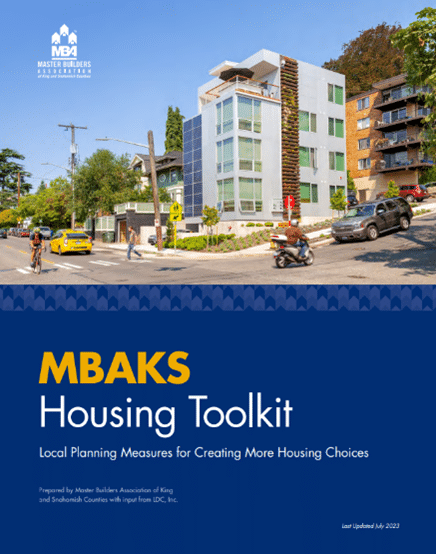Published on:

Under the theme “Local Permitting Changes to Make Home Happen Now,” the keynote speaker, a panel of local officials, and representatives from the Master Builders Association of King and Snohomish Counties (MBAKS) emphasized the importance of a timely, predictable, and fair permitting review process. Their remarks were made during the annual MBAKS Housing Solutions Breakfast, which attracted more than two dozen representatives from local jurisdictions along with a few hundred builders and affiliated interests.
Keynote speaker Sen. Mark Mullet from the 5th Legislative District and owner of several small businesses opened his talk with comments about interest rates. With rates hovering around 8% people are reluctant to list their homes, he observed, adding “Because there’s no turnover, new construction is more important than ever. If we’re going to lower the cost of housing in the State of Washington, the best place to start is the permit process.” A more reliable, timely, predictable permit process is needed, he added.
Mullet was a primary sponsor of Senate Bill 5290, which encourages local governments to streamline their permitting processes for new housing and provides grants so they can modernize their systems. The gubernatorial candidate, owner of several small businesses and former member of the Issaquah City Council, is endorsed by several housing industry groups. During the breakfast, MBAKS named Mullet the association’s “newest housing champion.”
Mullet also discussed investments in transportation infrastructure, calling for reforms on the sales tax on vehicles and the gas tax so funds can be shifted to better support infrastructure.
In response to a question about “the next big thing” for the state legislature, Mullet replied “transit-oriented development.” He also believes the urban growth boundary needs to be changed, work is needed to attract students to careers in the building trades, and more training is needed for jurisdictional staff around reading and interpreting codes affecting housing permits.
Following the keynote speech, panelists from local jurisdictions joined moderator and Snohomish County Executive Director Ken Klein to discuss how a timely, predictable and fair permitting process could affect the region’s ability to respond to the housing crisis. They agreed SB 5290 will streamline the process by requiring local governments to set permit review timelines. Partial refunds on permitting fees will be issued if deadlines are missed.
Panel members included Jeff Tate, Auburn’s director of community development, Mill Creek Mayor Brian Holtzclaw, and North Bend Mayor Rob McFarland.
When asked about hurdles and choke points in the permit process, panelists mentioned opposition to growth and more development, incomplete permit documents, SEPA (State Environmental Policy Act), and lack of communication early in the process.
Holtzclaw suggested institutionalizing past decisions on code interpretations, saying doing so could help smooth processing. He also believes helping elected officials better understand various aspects of the permit process, including financial impacts, might provide more context before updates are made. Tate said automatic approval of stamped drawings across jurisdictions could help increase the supply of “production homes.”
The breakfast program also featured a 3-minute video produced by MBAKS to illustrate the value of streamlined permitting.
In the video, Dagny Cooks, entitlements analyst at Pacific Ridge Homes said predictability and efficiency are “really important in the permitting review process because one of the first things we do when we start a project is set a schedule, then decide how to allocate of resources and time,” adding, “Anytime we run into delays in the permitting process means we have to reevaluate and that sometimes means greater costs. It means we might not choose to work in a particular jurisdiction because we know there are difficulties. All of those things can lead to less choice for the homebuyer.”
Travor Johnson, CEO at Blackwood Homes, said long permitting delays “really affect the supply side of housing. Everybody should be concerned about that because it raises the cost of housing for all.”

MBAKS reminded audience members about its Housing Toolkit. The 35-page document is intended as a guide for local governments. The tools can be adopted locally and do not require state legislative action. The booklet includes examples of local jurisdictions that are already using the tools and model codes and it outlines specific code updates and process improvements that would help provide more diverse and more affordable housing.